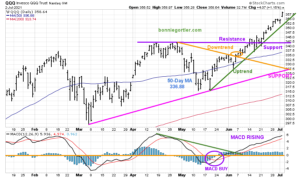Do you have money invested in the stock market? If so, are you aware of how your capital is invested? Would you be surprised if I told you that many people have no idea where their money is allocated? Many don’t know how much is invested in equities or bonds, whether in overseas or U.S. markets. This is because somebody else is making the decisions for them. Sometimes, the company they work for or an advisor/broker decides for them. I want to share a few gems for you to consider.
Is the market rising or falling?
Remember, when the market is rising, investing is easy, but when the market is falling, there are many more challenges, and different decisions are required.
1. Limit your loss and let your profits run. Most investors, including traders, sell their positions too soon when making money. On the other hand, investors can be very stubborn when an investment loses money, and the position should be sold. Taking a loss is sometimes hard, but controlling risk is necessary to make money. It is scary when the market is falling 2% a day for a few days in a row, and before you know it, you have lost 10% of the money you worked hard for. Investors either freeze or panic, not knowing what to do. I hear statements such as it will come back, it’s only a paper loss, and it’s not a lot of money, I have a small investment, or I don’t have to worry about it. It’s much better and sound portfolio management to take a small loss and not let it escalate. Even if you are wrong and the investment increases, you can always buy something else.
2. Risk Management: You want to be comfortable with your investments in the stock market. Don’t worry about what others say or think. You need to feel at ease. No matter what age you are, whether you are 20, 50, or 80 years old, you need to be able to sleep at night and not worry about your investments. My rule is that if you are not sleeping, your portfolio is not the correct investment. Protecting your assets is very important when you construct your portfolio.
3. Who is responsible for your investments? Decide if you will be in charge of your investments or a money manager is necessary. Remember, this does not have to be an all-or-nothing choice. Many investors enjoy following the market, making decisions on their portfolios, and executing trade for themselves. Trading can be invigorating, especially when you are making money. It’s different and much more challenging when the market is declining and a different feeling when you lose money. Giving up the control of part of your assets is a way to diversify your holdings. You still keep control of some assets while giving an investment advisor capital to supervise and deal with a different portion of your assets. In the end, no matter who is in charge, it’s your responsibility. to know.
4. Create an investment plan for your future. Here are some questions to ask yourself. What action are you going to take today to start the investment process to improve your investment outlook? Do you say you have no money, so the future doesn’t matter? Do you say it’s unimportant now and procrastinate and say I will wait until I am older? Have you considered where you will be 5 years from now if you keep doing what you are doing? Do you expect a different outcome without making a change? Unexpected situations occur; now is the time to be ready, not tomorrow. Do you have 6 to 8 months of living expenses saved in case a disaster occurs? You want to start somewhere. It is never too late to start a retirement fund, save for college, or your dream home or travel. Small steps will enable you to move forward and create the future wealth you desire. Proper planning, communication, and high-quality advice will guide you to suitable investment decisions.
5. Flexibility with your investments. Do you know where your money is invested right now? Do you have an exit strategy when times are rough? This is where you have the flexibility to move your money to safety at a moment’s notice. Do you know if you can be flexible by changing your investment holdings and having the option to be in cash or a money market where there is no investment risk? Is all your money tied up in company stock, and you cannot touch it for weeks, months, or years? Flexibility of your money is crucial in your investment plan as the market characteristics change very fast. Quick decisions are sometimes necessary for your benefit, so be aware and prepared.
Successful investing in the market is not a game; it will affect your life for years. You need to decide your investment goals and how much time you have to reach them to maximize the return on your money. You need to assess if the market is rising or falling. If the market is rising, it is much easier to make money, and you can get away with strategies that will be forgiving; however, if the market is falling, you should have an exit strategy to protect yourself. Markets fall twice as fast as they go up; remember that capital preservation is the key to successful investing.
If you like this article, you will love Grow and Sustain Your Wealth Free Report. HERE















